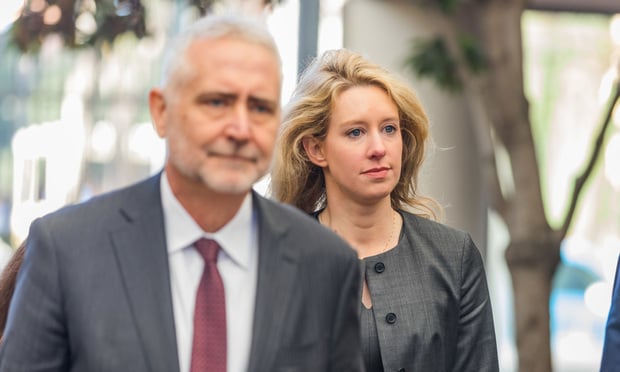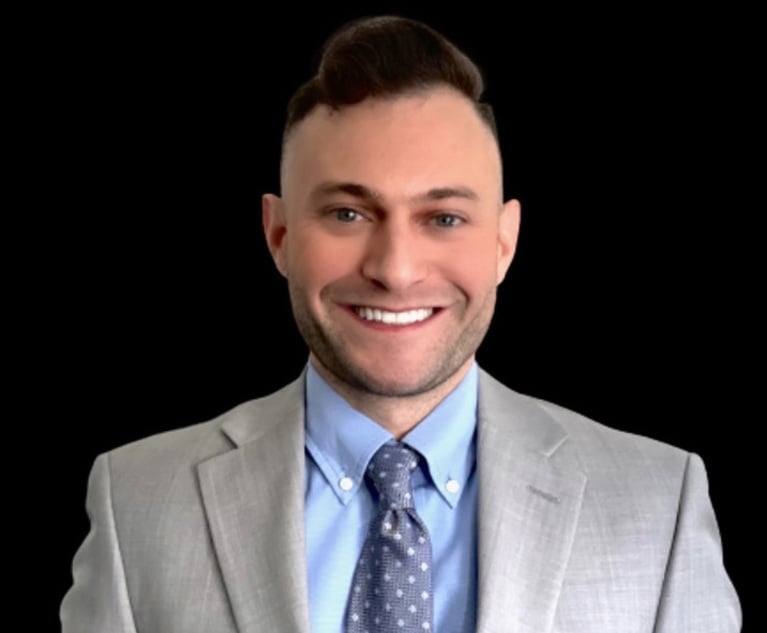Theranos Prosecutors: 'Common Sense' Only Thing Needed to Understand Charges Against Holmes
Federal prosecutors took aim at defense motions to dismiss the wire fraud case against Theranos founder Elizabeth Holmes arguing that they charged the case in a way that doesn't require them to point to specific false statements.
January 14, 2020 at 04:14 PM
4 minute read
 Elizabeth Holmes with Williams & Connolly attorney Kevin Downey head into the Northern District on Monday, January 13. Photo: Jason Doiy/ALM
Elizabeth Holmes with Williams & Connolly attorney Kevin Downey head into the Northern District on Monday, January 13. Photo: Jason Doiy/ALM
Federal prosecutors handling the government's criminal case against Theranos founder Elizabeth Holmes have fired back at claims that they failed to allege any single fraudulent statement or misrepresentation made about the now-defunct blood-testing company.
In court papers filed Monday, prosecutors argued that they charged the wire fraud case against Holmes and her codefendant, former company president Ramesh Balwani, in a way that does not require them to prove any particular statement was false.
But the prosecutors further pointed to nine separate representations Holmes and Balwani allegedly made to investors, patients and doctors about the reliability of Theranos' blood tests and the company's financial viability that they say proved to be false. Prosecutors wrote that the defense has already been provided with interview notes from investors who said Holmes had misled them to believe that Theranos' analyzer could perform more than 100 tests using a finger prick and slide decks from presentations to investors that were "brimming with false statements."
"Common sense is all that is required for a full understanding of the allegations in this case," wrote the prosecution team, which includes Jeff Schenk, John Bostic, Robert Leach and Vanessa Baehr-Jones, all assistant U.S attorneys in the Northern District of California.
Holmes and Balwani were initially indicted in July 2018 on two counts of conspiracy to commit wire fraud and nine counts of wire fraud based on claims they knew that Theranos' blood analyzer could not deliver on the public promises they were making to provide "fast, inexpensive, accurate, and reliable" tests.
The prosecutors' filings in the case come in response to motions filed last month by Holmes' lawyers at Williams & Connolly to dismiss the case or force the government to provide more detailed information about how it intends to show that Holmes and Balwani misled investors and customers about the company's blood-testing capacities, its partnership with the Walgreens pharmacy chain and the U.S. military, and any need Theranos might have had for regulatory approval. Balwani's lawyers at Orrick, Herrington & Sutcliffe filed court papers last month indicating that their client was joining Holmes' motions.
In Monday's filings, the federal prosecutors called the defense team's maneuvers "a premature attack on the evidence or a strategic attempt to limit the government's proof at trial." The government lawyers claim there's a simple reason why they did not attach a specific date or statement regarding the defendants' representations about the company's blood-testing technology: "Theranos's devises were never capable of doing the things Defendants claimed they could do."
The prosecution team also took issue with the defense contention that the government hadn't adequately alleged that doctors and patients were victims since neither group paid Theranos directly for services. The prosecutors wrote that allegations in the indictment strike at "the core of the bargain between Theranos and its customers."
"The medical tests offered by Theranos had essentially no value if they could not be relied upon, and defendants' decision to market those unreliable tests is the definition of intent to defraud," the prosecutors wrote. They also wrote that "the existence of some accurate test results does not create a loophole in the charges."
Kevin Downey of Williams & Connolly didn't respond to a message Tuesday. Jeffrey Coopersmith of Orrick said he had no comment on the government filings.
Read more:
FDA's Top Lawyer Says Theranos Case Places 'Unprecedented' Discovery Strain on Agency
Lawyers for Elizabeth Holmes Make Dismissal Bid in Theranos Criminal Case
Judge to Let Cooley Bow Out of Representing Elizabeth Holmes in Theranos Civil Case
In Theranos Civil Case, Cooley Says Elizabeth Holmes Has Growing Unpaid Legal Bill
Orrick Adds White-Collar Trio, Including Ex-Theranos COO's Lawyer
Judge Nudges Agencies to Hand Over Info to Theranos Defendants
This content has been archived. It is available through our partners, LexisNexis® and Bloomberg Law.
To view this content, please continue to their sites.
Not a Lexis Subscriber?
Subscribe Now
Not a Bloomberg Law Subscriber?
Subscribe Now
NOT FOR REPRINT
© 2025 ALM Global, LLC, All Rights Reserved. Request academic re-use from www.copyright.com. All other uses, submit a request to [email protected]. For more information visit Asset & Logo Licensing.
You Might Like
View All
'Pull Back the Curtain': Ex-NFL Players Seek Discovery in Lawsuit Over League's Disability Plan

'Be Comfortable Being Uncomfortable': Pearls of Wisdom From 2024 GC Q&As


Insurers Dodge Sherwin-Williams' Claim for $102M Lead Paint Abatement Payment, State High Court Rules
Law Firms Mentioned
Trending Stories
- 1‘Catholic Charities v. Wisconsin Labor and Industry Review Commission’: Another Consequence of 'Hobby Lobby'?
- 2With DEI Rollbacks, Employment Lawyers See Potential For Targeting Corporate Commitment to Equality
- 3In-House Legal Network The L Suite Acquires Legal E-Learning Platform Luminate+
- 4In Police Shooting Case, Kavanaugh Bleeds Blue and Jackson ‘Very Very Confused’
- 5Trump RTO Mandates Won’t Disrupt Big Law Policies—But Client Expectations Might
Who Got The Work
J. Brugh Lower of Gibbons has entered an appearance for industrial equipment supplier Devco Corporation in a pending trademark infringement lawsuit. The suit, accusing the defendant of selling knock-off Graco products, was filed Dec. 18 in New Jersey District Court by Rivkin Radler on behalf of Graco Inc. and Graco Minnesota. The case, assigned to U.S. District Judge Zahid N. Quraishi, is 3:24-cv-11294, Graco Inc. et al v. Devco Corporation.
Who Got The Work
Rebecca Maller-Stein and Kent A. Yalowitz of Arnold & Porter Kaye Scholer have entered their appearances for Hanaco Venture Capital and its executives, Lior Prosor and David Frankel, in a pending securities lawsuit. The action, filed on Dec. 24 in New York Southern District Court by Zell, Aron & Co. on behalf of Goldeneye Advisors, accuses the defendants of negligently and fraudulently managing the plaintiff's $1 million investment. The case, assigned to U.S. District Judge Vernon S. Broderick, is 1:24-cv-09918, Goldeneye Advisors, LLC v. Hanaco Venture Capital, Ltd. et al.
Who Got The Work
Attorneys from A&O Shearman has stepped in as defense counsel for Toronto-Dominion Bank and other defendants in a pending securities class action. The suit, filed Dec. 11 in New York Southern District Court by Bleichmar Fonti & Auld, accuses the defendants of concealing the bank's 'pervasive' deficiencies in regards to its compliance with the Bank Secrecy Act and the quality of its anti-money laundering controls. The case, assigned to U.S. District Judge Arun Subramanian, is 1:24-cv-09445, Gonzalez v. The Toronto-Dominion Bank et al.
Who Got The Work
Crown Castle International, a Pennsylvania company providing shared communications infrastructure, has turned to Luke D. Wolf of Gordon Rees Scully Mansukhani to fend off a pending breach-of-contract lawsuit. The court action, filed Nov. 25 in Michigan Eastern District Court by Hooper Hathaway PC on behalf of The Town Residences LLC, accuses Crown Castle of failing to transfer approximately $30,000 in utility payments from T-Mobile in breach of a roof-top lease and assignment agreement. The case, assigned to U.S. District Judge Susan K. Declercq, is 2:24-cv-13131, The Town Residences LLC v. T-Mobile US, Inc. et al.
Who Got The Work
Wilfred P. Coronato and Daniel M. Schwartz of McCarter & English have stepped in as defense counsel to Electrolux Home Products Inc. in a pending product liability lawsuit. The court action, filed Nov. 26 in New York Eastern District Court by Poulos Lopiccolo PC and Nagel Rice LLP on behalf of David Stern, alleges that the defendant's refrigerators’ drawers and shelving repeatedly break and fall apart within months after purchase. The case, assigned to U.S. District Judge Joan M. Azrack, is 2:24-cv-08204, Stern v. Electrolux Home Products, Inc.
Featured Firms
Law Offices of Gary Martin Hays & Associates, P.C.
(470) 294-1674
Law Offices of Mark E. Salomone
(857) 444-6468
Smith & Hassler
(713) 739-1250






